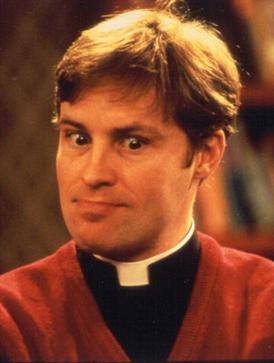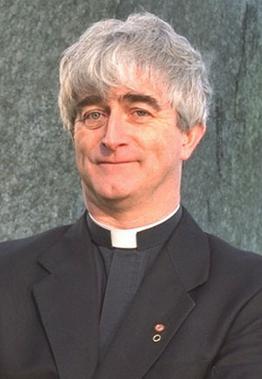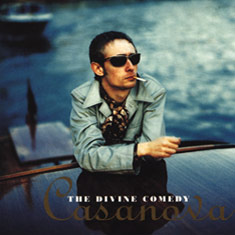Related Research Articles

Father Ted is a sitcom created by Irish writers Graham Linehan and Arthur Mathews and produced by British production company Hat Trick Productions for British television channel Channel 4. It aired over three series from 21 April 1995 until 1 May 1998, including a Christmas special, for a total of 25 episodes. It aired on Nine Network and ABC Television in Australia, and on TV2 in New Zealand.

Father Dougal McGuire is a character in the Channel 4 sitcom Father Ted. Created by Arthur Mathews and Graham Linehan, Dougal was portrayed by comedian Ardal O'Hanlon for the programme's three series. The character is a childlike, simple-minded Roman Catholic curate exiled to Craggy Island, a small island off the coast of Galway.

Father Ted Crilly is the eponymous main character of the British Channel 4 situation comedy Father Ted. Created by Graham Linehan and Arthur Mathews, Ted was portrayed by comedian Dermot Morgan for the programme's three series. The character is a morally dubious Roman Catholic priest exiled to Craggy Island, a small island off the coast of Galway in Ireland.

Edward Neil Anthony Hannon is a singer and songwriter from Northern Ireland. He is the founder and frontman of the chamber pop group the Divine Comedy, and is the band's only constant member since its inception in 1989. Hannon wrote the theme tunes for the television sitcoms Father Ted and The IT Crowd, as well as the original songs for the musical film Wonka (2023).

The Divine Comedy are a pop band from Northern Ireland, formed in 1989 and fronted by Neil Hannon. Hannon has been the only constant member of the group, playing, in some instances, all of the non-orchestral instrumentation except drums. The band has released 12 studio albums. Between 1996 and 1999, nine singles released by the band made the top 40 of the UK Singles Chart, including the 1999 top ten hit, "National Express".
Arthur Mathews is an Irish comedy writer and actor who, often with writing partners such as Graham Linehan, Paul Woodfull and Matt Berry, has either written or contributed to television comedies, such as Father Ted, Big Train, and Toast of London and Harry Enfield and Chums.

Yann Pierre Tiersen is a French Breton musician and composer. His musical career is split between studio recordings, music collaborations, and film soundtracks songwriting. His music incorporates a large variety of classical and contemporary instruments, primarily the electric guitar, the piano, synthesisers, and the violin, but he also includes instruments such as the melodica, xylophone, toy piano, harpsichord, piano accordion, and even a typewriter.

Liberation is the second album by Northern Irish chamber pop band the Divine Comedy, released on 18 August 1993 by Setanta Records. Following the unsuccessful Fanfare for the Comic Muse, the group started improvising on their new album which was recorded in Fundamental, London in March 1993. Although it was the band's second album, the band's leader, Neil Hannon, often refers to it as the first, due to the stylistic differences from their debut album, Fanfare for the Comic Muse.

Casanova is the fourth studio album by Northern Irish chamber pop band the Divine Comedy. It was released in 1996 by Setanta Records, and it happened to be the band's commercial breakthrough. It was certified Gold in the UK in July 1997, aided by the release of the album's first single, "Something for the Weekend", which reached No. 13 on the charts. Two other singles released from the album, "Becoming More Like Alfie" and "The Frog Princess", charted at No. 27 and No. 15, respectively.

A Secret History... The Best of the Divine Comedy is a greatest hits compilation album by Irish chamber pop band the Divine Comedy, released in 1999 by Setanta Records.

Fin de Siècle is the sixth album by Northern Irish pop band the Divine Comedy. It was released on 31 August 1998 by Setanta Records. Following the release of fifth studio album A Short Album About Love (1997), frontman Neil Hannon demoed new material at his flat in Clapham. During this time, the relationship between the band and their label Setanta Records was straining as a result of heated discussions over tour costs and studio sessions. They recorded their next album in three studios with Jon Jacobs as the main producer and Hannon co-producing. Fin de Siècle is a chamber pop concept album that details living in the 20th century.

A Short Album About Love is the fifth studio album by Northern Irish chamber pop band the Divine Comedy, released in 1997 by Setanta Records. It was recorded on 20 October 1996 at Shepherd's Bush Empire, London.

Fanfare for the Comic Muse is the debut album by Northern Irish chamber pop band the Divine Comedy, released in 1990 by Setanta Records. Recording took place at Homestead Studios in May 1990 with producer Sean O Neill. Lorcan Mac Loughlann engineered the sessions, and Mudd Wallace mixed the recordings.
"A Song for Europe" is the fifth episode of the second series of the Channel 4 sitcom Father Ted and the 11th episode overall. It originally aired on 5 April 1996 and has since been recognised as one of the most popular episodes of the show.

"National Express" is a song by Northern Irish band the Divine Comedy. On 25 January 1999, it was released as the third single from their sixth album, Fin de Siècle (1998), and reached number eight on the UK Singles Chart and number 18 in Ireland. The song is based on Neil Hannon's observations of life from the window of a National Express coach.
"The Pop Singer's Fear of the Pollen Count" is a song by the Divine Comedy. Written by Neil Hannon, it was originally recorded for the Liberation album and was issued as the B-side of "Lucy".

"Generation Sex" is a song by the Divine Comedy. It was the first single from the album Fin de Siècle and features narration by presenter and columnist Katie Puckrik. It reached number nineteen on the UK Singles Chart.
"Lucy" is the debut single by the Divine Comedy, released in October 1993. Written by Neil Hannon and William Wordsworth, it is the only single from the album Liberation.

The discography of Northern Irish chamber pop band the Divine Comedy consists of twelve studio albums, two live albums, two compilation albums, five extended plays and twenty-six singles.
References
- ↑ "The Official Charts Company - Gin Soaked Boy by The Divine Comedy Search". The Official Charts Company. 11 July 2013.
- ↑ "Gin Soaked Boy [Single]" . Retrieved 13 May 2013.